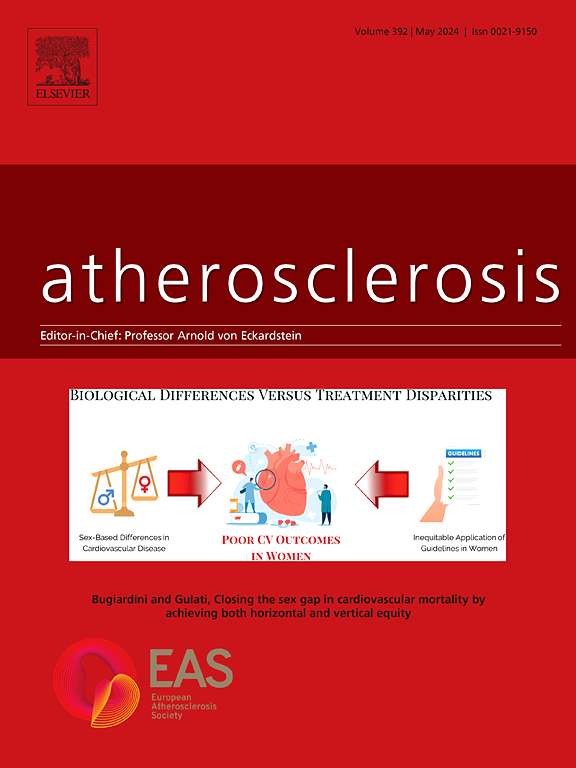A study into rare GPR146 gene variants in humans and mice
IF 4.9
2区 医学
Q1 CARDIAC & CARDIOVASCULAR SYSTEMS
引用次数: 0
Abstract
Background and aims
G-protein coupled receptor 146 (GPR146)-deficient mice exhibit a moderate 21 % reduction in plasma cholesterol. This is associated with decreased phosphorylation of ERK1/2 and reduced SREBP2 activity in the liver, which leads to lower VLDL secretion. Insight into the role of GPR146 in humans is however limited. We therefore set out to study rare genetic variants in GPR146 to improve our understanding of this new player in lipid metabolism.
Methods
We used whole genome sequencing data from UK Biobank participants to search for rare coding variants in GPR146. We first carried out gene-based burden tests (using SAIGE-GENE-framework) and examined the association of individual variants with plasma cholesterol levels. One of the variants (P62L) was also studied using the Global Lipids Genetics Consortium (GLGC) data set and in a knock-in mouse model.
Results
We found that the combination of rare genetic variants identified in GPR146 is significantly associated with plasma cholesterol levels. Three rare variants, i.e. P62L, I129I, and A175T were individually associated with reduced plasma cholesterol. In the GLGC cohort, the P62L variant was associated with reductions in both HDL and LDL cholesterol. Follow-up experiments show lower plasma cholesterol levels in GPR146P61L male and female mice (−13 %, p < 0.05 and −15 %, p < 0.005, respectively) when compared to controls due to a reduction in HDL cholesterol. The GPR146P61L mice did not exhibit a change in VLDL secretion. In line, the ERK1/2 signalling pathway and Srebp2 mRNA expression in liver homogenates, and the secretion of apoB by primary hepatocytes of GPR146P61L and wild-type mice were unchanged.
Conclusions
This study shows that rare GPR146 gene variants are associated with lower plasma cholesterol levels in humans. One of these variants, P62L is associated with reductions of HDL cholesterol and LDL cholesterol in humans while the ortholog in mice confers a loss of GPR146 function leading to only reduced HDL cholesterol. How GPR146 affects HDL metabolism in humans and mice remains to be resolved.

求助全文
约1分钟内获得全文
求助全文
来源期刊

Atherosclerosis
医学-外周血管病
CiteScore
9.80
自引率
3.80%
发文量
1269
审稿时长
36 days
期刊介绍:
Atherosclerosis has an open access mirror journal Atherosclerosis: X, sharing the same aims and scope, editorial team, submission system and rigorous peer review.
Atherosclerosis brings together, from all sources, papers concerned with investigation on atherosclerosis, its risk factors and clinical manifestations. Atherosclerosis covers basic and translational, clinical and population research approaches to arterial and vascular biology and disease, as well as their risk factors including: disturbances of lipid and lipoprotein metabolism, diabetes and hypertension, thrombosis, and inflammation. The Editors are interested in original or review papers dealing with the pathogenesis, environmental, genetic and epigenetic basis, diagnosis or treatment of atherosclerosis and related diseases as well as their risk factors.
 求助内容:
求助内容: 应助结果提醒方式:
应助结果提醒方式:


